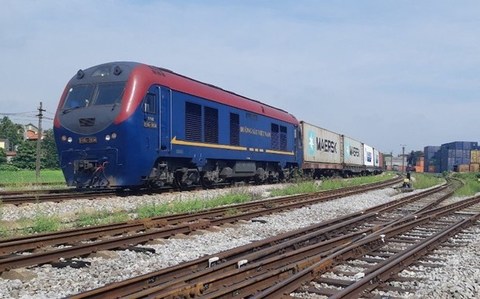
Việt Nam Railways (VNR) on July 20 added a new rail freight link from Việt Nam to Belgium, with the first train departing from Yên Viên Station, Hà Nội, and expected to arrive at Liege City in Belgium.
In the context of complicated developments of the COVID-19 epidemic and difficulties in passenger transport, the railway industry is accelerating logistics services to reduce challenges for business.
Nguyen Hoang Thanh, Deputy General Director of Railway Trading and Transport Joint Stock Company (Ratraco) under the Viet Nam Railways Corporation told the Vietnam News Agency about the issue.
What is Ratraco doing to promote its freight business activities, including providing logistics services for trains on the intermodal rail transport route with the opening of a container train from Viet Nam to Belgium?
Viet Nam Railways (VNR) on July 20 added a new rail freight link from Viet Nam to Belgium, with the first train departing from Yen Vien Station, Ha Noi, and expected to arrive at Liege City in Belgium.
Containers will then be delivered to Rotterdam City (Netherlands) by lorries.
VNR said the train had 23 containers with goods such as textiles, leather and footwear. During its journey, the train will stop at Zhengzhou city in China’s Henan Province and connect to the Asia-Europe train in China to reach its destination, transiting through Russia, Belarus, Poland and Germany.
The whole journey from Viet Nam to Belgium is expected to take about 25 days.
The second container train to Belgium departed from Yen Vien on July 27. The third and fourth container trains to Belgium are expected to depart from the railway station on August 5 and August 10, respectively.
In the past, the railway industry, and Ratraco in particular, has promoted transport activities and provided railway logistics services, including participation in international rail transport to China and European countries.
However, an international freight train through so many countries needs to meet a lot of conditions, including containers meeting international standards.
In an agreement between Viet Nam Railways and China Railways, China supplied empty containers to Viet Nam.
However, from mid-2020, there was a lack of empty containers for cargo transport by seaway and railway, so from October 2020, China Railways suspended the supply of empty containers for Viet Nam railways to transport goods to Europe.
Therefore, Viet Nam Railways has agreed to cooperate with the Danish shipping company Maersk Lines in transporting cargo containers from Viet Nam to Belgium with Maersk Lines’ supports in providing empty containers and other logistics conditions.
For Viet Nam, the new rail freight link has great meaning which is to create a connection between Viet Nam Railways and other countries' railways for cargo transportation.
On the other hand, it will promote the development of the domestic railway industry’s logistics services in the future.
When freight transport by sea returns to normal operations, Maersk Lines will also still cooperate to transport goods. Trains with the advantage of being able to run deep in land will help shipping companies to collect goods, especially large shipping lines like Maersk Lines. This will be a new business for Viet Nam's railway industry.
During the complicated development of the COVID-19 epidemic, sea transport has become congested, and this helps import and export enterprises have more options to transport goods.
Why can't Viet Nam Railways have its own train providing direct freight services to Europe instead of being an intermediary in the logistics service supply chain?
Viet Nam Railways has struggled to develop an intermodal transport train from Viet Nam to Europe because there are a lot of requirements. Of which, the most important is still the limited capacity of Viet Nam's railway infrastructure. Viet Nam has established one train with 23 carriages (plus locomotives and logistics cars).
Meanwhile, an intermodal transport train on the Asia-Europe route must have a minimum of 41 carriages. Therefore, Viet Nam must cooperate with China's railways to ensure the above conditions are met.
In addition, Viet Nam Railways can not meet many other conditions in international rail transport such as conditions on transport vehicles and containers.
What advantage does the railway industry have in international intermodal transport to compete with other modes of transport, especially by sea?
For a long time, rail freight rates have been higher than sea freight rates. However, trains have the advantage of running faster than ships.
For example, from Viet Nam to Europe, it takes 25 days to travel by rail and 35 days by sea. Therefore, depending on the value of the goods, rail may be cheaper.
At present, maritime freight transport has faced many difficulties due to the COVID-19 pandemic, so the railway industry will take this opportunity to increase its market share in freight transport.
Providing logistics services for large companies such as Maersk Lines will bring many business opportunities to Viet Nam's railway industry.
In addition, the railway industry will provide services of packing goods at warehouses into containers and then transporting them to the railway station. — VNS